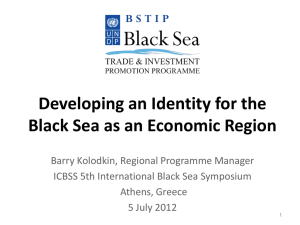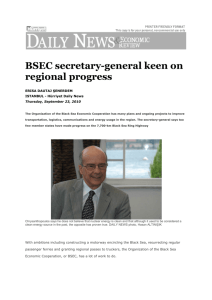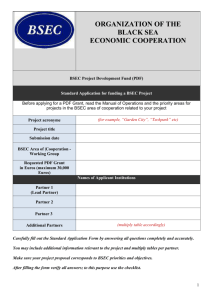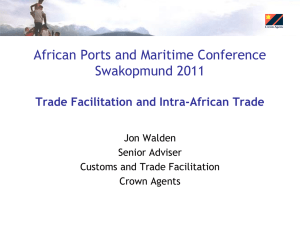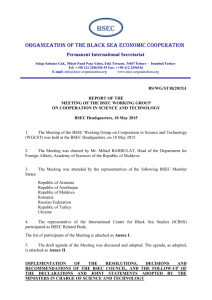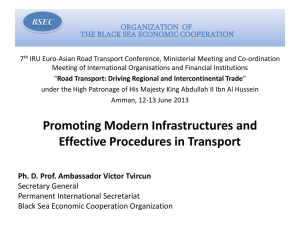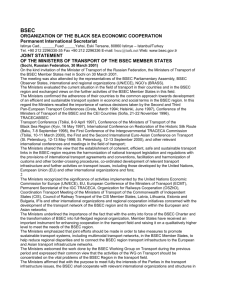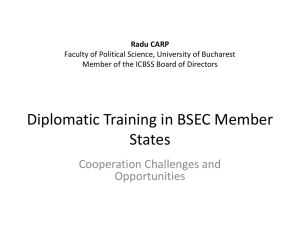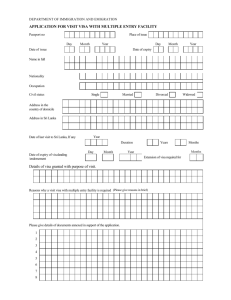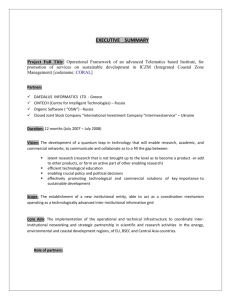Recommendation on Facilitating Free Movement of Goods and People
advertisement
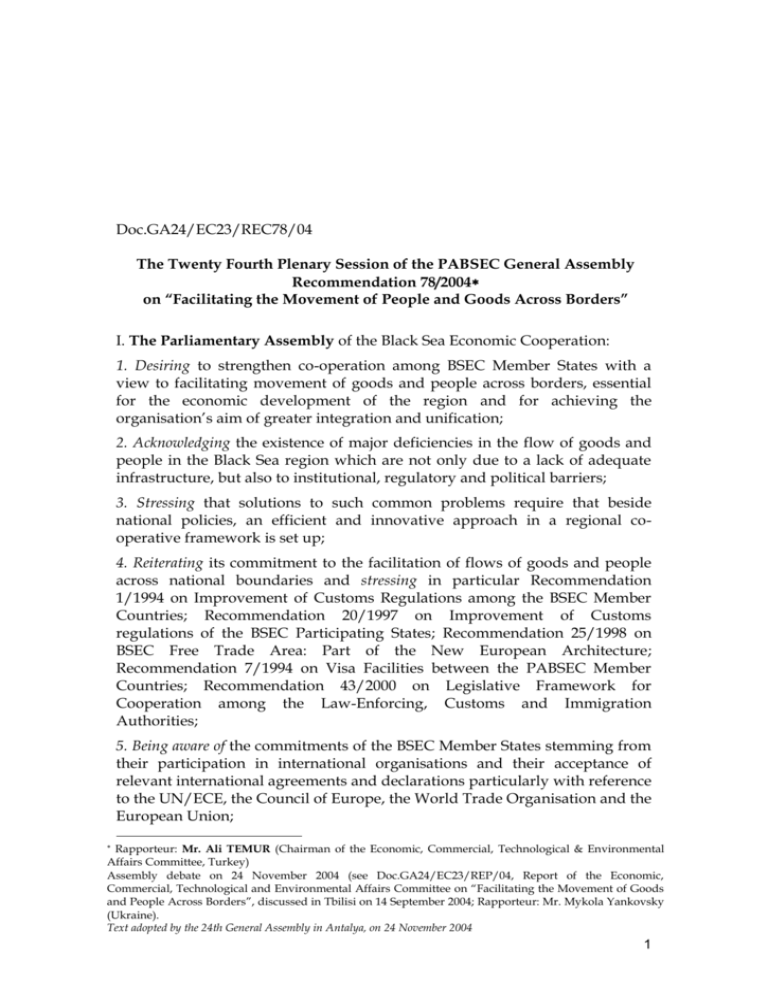
Doc.GA24/EC23/REC78/04 The Twenty Fourth Plenary Session of the PABSEC General Assembly Recommendation 78/2004 on “Facilitating the Movement of People and Goods Across Borders” I. The Parliamentary Assembly of the Black Sea Economic Cooperation: 1. Desiring to strengthen co-operation among BSEC Member States with a view to facilitating movement of goods and people across borders, essential for the economic development of the region and for achieving the organisation’s aim of greater integration and unification; 2. Acknowledging the existence of major deficiencies in the flow of goods and people in the Black Sea region which are not only due to a lack of adequate infrastructure, but also to institutional, regulatory and political barriers; 3. Stressing that solutions to such common problems require that beside national policies, an efficient and innovative approach in a regional cooperative framework is set up; 4. Reiterating its commitment to the facilitation of flows of goods and people across national boundaries and stressing in particular Recommendation 1/1994 on Improvement of Customs Regulations among the BSEC Member Countries; Recommendation 20/1997 on Improvement of Customs regulations of the BSEC Participating States; Recommendation 25/1998 on BSEC Free Trade Area: Part of the New European Architecture; Recommendation 7/1994 on Visa Facilities between the PABSEC Member Countries; Recommendation 43/2000 on Legislative Framework for Cooperation among the Law-Enforcing, Customs and Immigration Authorities; 5. Being aware of the commitments of the BSEC Member States stemming from their participation in international organisations and their acceptance of relevant international agreements and declarations particularly with reference to the UN/ECE, the Council of Europe, the World Trade Organisation and the European Union; Rapporteur: Mr. Ali TEMUR (Chairman of the Economic, Commercial, Technological & Environmental Affairs Committee, Turkey) Assembly debate on 24 November 2004 (see Doc.GA24/EC23/REP/04, Report of the Economic, Commercial, Technological and Environmental Affairs Committee on “Facilitating the Movement of Goods and People Across Borders”, discussed in Tbilisi on 14 September 2004; Rapporteur: Mr. Mykola Yankovsky (Ukraine). Text adopted by the 24th General Assembly in Antalya, on 24 November 2004 1 6. Expressing its concern that the European Union’s parallel deepening and enlargement processes may create an impediment to the free movement of goods and people between BSEC Member – States with possible adverse consequences for the regional integration process; 7. Stating its firm opposition to any measures which might act to divide the peoples, states and markets of a continent which has only recently achieved a historic level of political, social, economic and cultural unity and harmony; 8. Convinced that the free movement of goods and people among the BSEC member countries needs to be reconsidered and enhanced as policies have to adapt to current and future challenges posed by the astonishing increases in the flows of goods and people world wide, the challenges that the EU enlargement poses vis-à-vis cross-boundary movements in the continent and the Black Sea region; and the urgency for enhanced and efficient cooperation among countries to deal with the demands for more open but also safer borders; 9. In view of increased danger and challenges of terrorism – this plague of the 21st century – the BSEC Member States in their activities in the field of economic cooperation have to envisage measures for counteracting terrorist threats and increasing security in the BSEC region. II. The Parliamentary Assembly therefore calls on the National Parliaments and the Governments of the BSEC Participating States: A. In the field of facilitating cross-border movement of goods: i. to devote the necessary attention to harmonize and simplify customs procedures by creating clear commitments in relation to fees and charges; document and data formalities; and to introduce new technologies such as electronic data processing, data exchange and risk analysis methods in order to perform effective controls; ii. to ensure transparency of customs laws and procedures and undertake measures for the elimination of bureaucratic formalities and opportunities for corruption especially in public services; iii. to achieve real implementation of the freedom of transit by reducing the scope for undue discrimination, by calibrating border requirements to what is really needed for transit, and by encouraging creation of efficient regional transit systems especially in poor regions; iv. to take necessary steps with the aim of harmonizing existing standards and certification systems of the Member States, promoting, whenever possible broader application of the standards of the International Standards Organization (ISO); v. to enhance cooperation towards the harmonization of certain key-elements concerning cross border movement of goods in the region, among others in line with the provisions of the “Memorandum of Understanding on facilitation of road transport of goods in the BSEC region” and in particular; 2 a. to take coordinated steps towards gradual liberalisation of international road transport of goods on the basis of removing hampering barriers mutually beneficial participation of road transport operators in bilateral and transit transportation; b. to introduce and promote adequate intermodal transport services to ensure additional and complementary capacities in international road transport; c. to endeavour to accede, as soon as possible, to agreements and conventions established under the auspices of the World Customs Organisation, UN/ECE as well as their bilateral agreements or mutual assistance in customs matters. Also to adapt their national legislation to certain aspects derived from the European Community regulatory framework in fields such as weights and dimensions of goods road vehicles in international traffic, transport of dangerous goods, application of certain social regulations, etc.; d. to place importance on rationalisation and gradual harmonization of charging policies for international road transport of goods and incorporate into the respective charging policies, the principles of costrelatedness, non-discrimination and transparency; vi. to speed up liberalization of regional trade among others through reducing tariffs and other barriers to trade, which adversely influence the flow of goods between the countries of the BSEC region. As envisaged in the BSEC Economic Agenda, efforts to this end could involve; a. the revision of Member States’ legal provisions which currently constitute barriers to efficient trade; b. promoting the selective reduction of such barriers, while taking care to avoid undue damage to the private sector in individual countries; c. studying the possibilities of providing selective incentives to key sectors in each member state so as to enable them to eventually become competitive in the absence of protective measures; vii. to initiate measures of customs modernization and capacity build-up, inter alia, by strengthening and participating in customs technical cooperation programmes designed to share expertise; viii. to establish working level public – private to facilitate and stimulate border crossing improvements; ix. to set up a border crossing facilitation joint website or information system in order to publish information on border crossing procedures and conditions in the BSEC region; x. to hold regular cross border facilitation meetings among the transport, customs and other representatives of the member states making use of the BSEC framework in order to exchange information and experience and coordinate activities and reforms. One approach would be to designate a limited number of joint projects where the immediate objective would be to strengthen the integration between the different agencies across borders; 3 xi. to expand their bilateral agreements about mutual assistance in the customs activity field; xii. to upgrade infrastructure at border crossing points to meet the needs of increased flow of goods and persons; B. In the field of the cross border movement of people i. to ratify and implement without delay the conventions, agreements and other treaties of the Council of Europe in the fields of free movement of persons and of police and judicial cooperation such as the 1955 European Convention on Establishment, the 1957 European Agreement on Regulations Governing the Movement of Persons between Member States of the Council of Europe, the European Convention on the Legal Status of Migrant Workers, the European Outline Convention on Transfrontier Cooperation between Territorial Communities or Authorities, the 1959 European Convention on Mutual Assistance in Criminal Matters and its Additional Protocols, and others; ii. particularly for the states which are party to the 1990 Schengen Convention to expand their consular services in the BSEC Member States so as to ensure that visas are issued quickly, efficiently and conveniently and to improve the number of and facilities at border crossings with the non-EU member neighbouring states; iii. to review legal documents relating to policies and mechanisms directly relating the administration of entry/exit and residency registration of businessmen from the BSEC region while not contradicting to the international commitments of each member state; iv. to encourage the relevant national authorities to examine possibilities to facilitate the granting of visa and to maintain the level of visa fees at the lowest level possible, particularly for local businessmen, residents of border regions, those engaged in legitimate small cross-border traffic and professional drivers engaged in international road transport aiming at simplifying the formalities, reducing the time required to obtain visa and issuing multiple entry visa valid for one year without prejudice to other existing agreements; v. to establish special provisions for political, diplomatic travel and certified official missions by citizens of the BSEC member states by easing visa or even exempting them from visa requirements whenever possible or obtaining a visa free of charge, rapidly, on the spot, for the duration of their official duties; vi. to establish principles for the standardisation of travel documents so as to provide safeguards against forgery and fraudulent use and thus facilitate liberalisation of visa regimes; III. The Parliamentary Assembly invites the BSEC Council of the Ministers of Foreign Affairs to consider this Recommendation. 4
